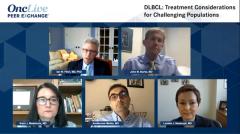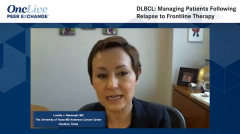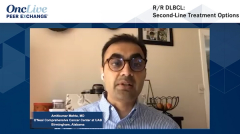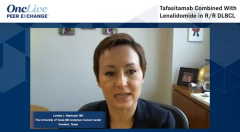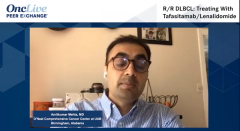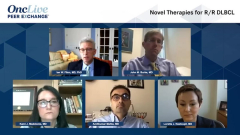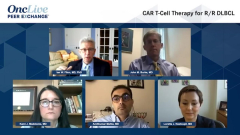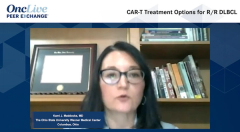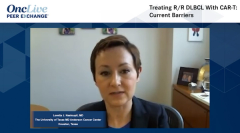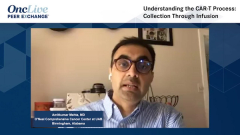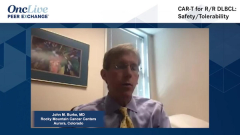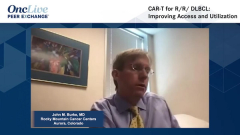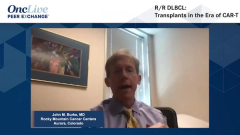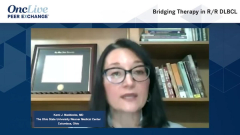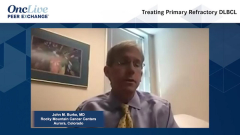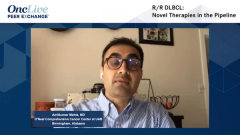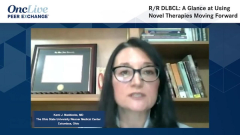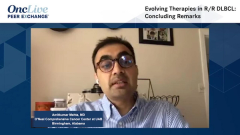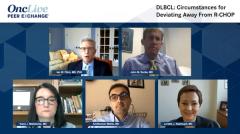
CAR T for R/R DLBCL: Safety/Tolerability
Episodes in this series

Ian W. Flinn, MD, PhD: John, I’d like to talk a little about the safety of CAR [chimeric antigen receptor] T-cell therapies. The safety is getting better regarding the products we have as well as the next-generation therapies that are going through clinical trials. We see at least 2 major adverse events associated with CAR T-cell therapies: cytokine release syndrome [CRS] and neurotoxicities. Is this getting better? If it is, why is it getting better from when they were originally approved?
John M. Burke, MD: I haven’t delivered these treatments. Not being a CAR T-cell doctor, I can look at the literature and what people are saying and reporting. To me it looks like the incidence of cytokine release syndrome is lower with liso-cel [lisocabtagene maraleucel] compared with the others. Tisa-cel [tisagenlecleucel] is in between. The timing is different. CRS occurs a bit later after liso-cel [lisocabtagene maraleucel]. That potentially makes that particular product capable of being delivered in the outpatient setting. Patients could get the treatment and then wait several days. If they have a problem, they can get admitted later.
That’s exactly what the study that Loretta mentioned earlier showed at ASH [American Society of Hematology Annual Meeting]. This could be done safely, at a slightly wider number of centers and type of centers, compared with in the past. The newer product, liso-cel [lisocabtagene maraleucel], looks to have a lower toxicity level. That’s what other people who have used all the products have indicated to me. Whether it’s the 4-1BB or the 1:1 ratio of CD4 to CD8 T cells, or the patient population, those may be factors in regard to the differences.
Ian W. Flinn, MD, PhD: Kami, do you think we’ve made progress in the adverse-event profiles of the products that we have? Some of the trials have suggested that later on in the trials the adverse-event incidence rates went down. In your hands, at your center, do you feel like we’re in a better place than we were a year or 2 years ago in terms of managing adverse events? If so, why is that true?
Kami J. Maddocks, MD: Probably for a couple of reasons. One reason is the ability to recognize the CRS and the neurotoxicity earlier. Then the treatment approaches: when and how to use steroids, tocilizumab, and intrathecal chemotherapy, even with neurotoxicity. But also recognizing when it’s occurring and then the treatment for it and instituting that treatment earlier on has helped improve the toxicity profiles as we’ve gotten more experience.
Ian W. Flinn, MD, PhD: Does that cut into efficacy if you’re intervening early with steroids? When CAR T cells were first being developed, there was this great fear of giving people steroids. There was concern that you’d be killing the T cells, killing the efficacy. Do you think that affects efficacy?
Kami J. Maddocks, MD: We’ve had a little bit of retrospective data on this. I know Loretta probably can speak to it best, because the data comes out of her institution The University of Texas MD Anderson Cancer Center, but there was some suggestion that maybe there could be a little change. Overall, it probably doesn’t largely affect them.
Loretta J. Nastoupil, MD: I agree. I think the message from our retrospective study is that you have to be careful about the dose and duration of therapy. We’ve gotten much more comfortable intervening with corticosteroids earlier on in the course of toxicity. You should still be mindful of having patients on huge doses for prolonged periods of time. That’s probably not a good thing.
Transcript Edited for Clarity


